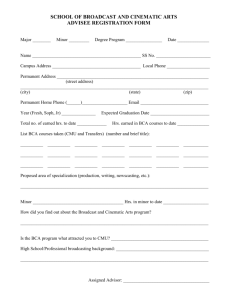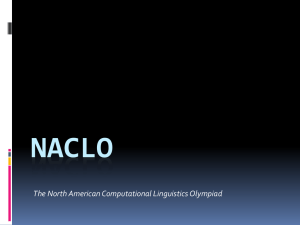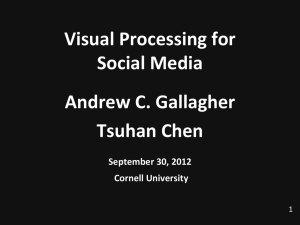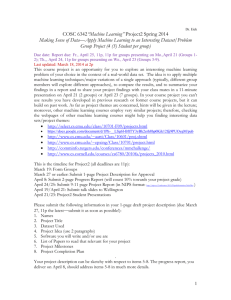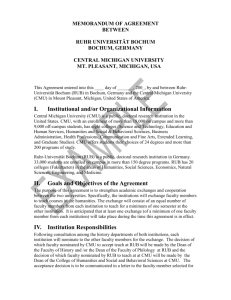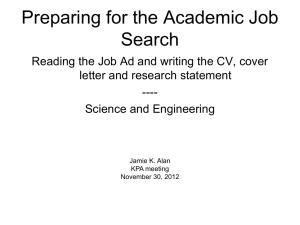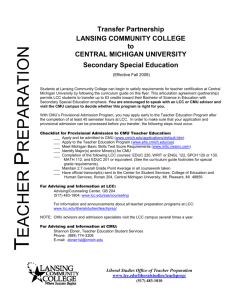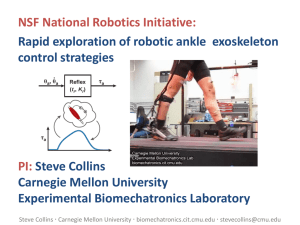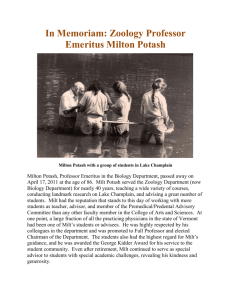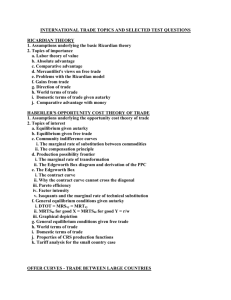Models of Software Systems syllabus.
advertisement
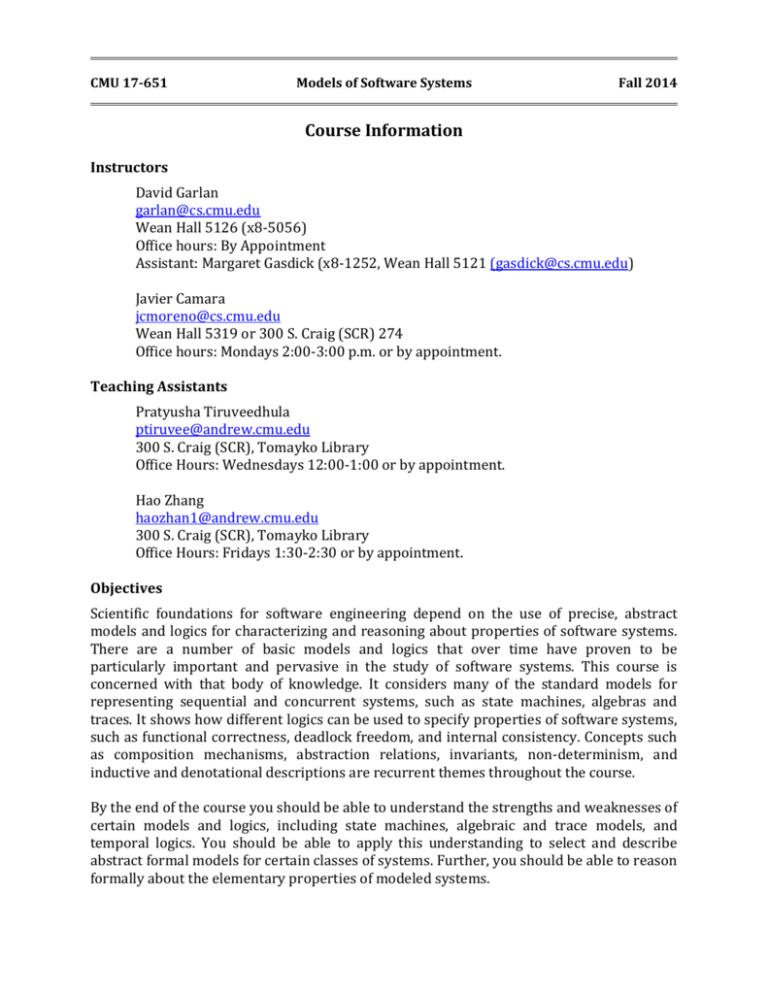
CMU 17-651 Models of Software Systems Fall 2014 Course Information Instructors David Garlan garlan@cs.cmu.edu Wean Hall 5126 (x8-5056) Office hours: By Appointment Assistant: Margaret Gasdick (x8-1252, Wean Hall 5121 (gasdick@cs.cmu.edu) Javier Camara jcmoreno@cs.cmu.edu Wean Hall 5319 or 300 S. Craig (SCR) 274 Office hours: Mondays 2:00-3:00 p.m. or by appointment. Teaching Assistants Pratyusha Tiruveedhula ptiruvee@andrew.cmu.edu 300 S. Craig (SCR), Tomayko Library Office Hours: Wednesdays 12:00-1:00 or by appointment. Hao Zhang haozhan1@andrew.cmu.edu 300 S. Craig (SCR), Tomayko Library Office Hours: Fridays 1:30-2:30 or by appointment. Objectives Scientific foundations for software engineering depend on the use of precise, abstract models and logics for characterizing and reasoning about properties of software systems. There are a number of basic models and logics that over time have proven to be particularly important and pervasive in the study of software systems. This course is concerned with that body of knowledge. It considers many of the standard models for representing sequential and concurrent systems, such as state machines, algebras and traces. It shows how different logics can be used to specify properties of software systems, such as functional correctness, deadlock freedom, and internal consistency. Concepts such as composition mechanisms, abstraction relations, invariants, non-determinism, and inductive and denotational descriptions are recurrent themes throughout the course. By the end of the course you should be able to understand the strengths and weaknesses of certain models and logics, including state machines, algebraic and trace models, and temporal logics. You should be able to apply this understanding to select and describe abstract formal models for certain classes of systems. Further, you should be able to reason formally about the elementary properties of modeled systems. CMU 17-651 Models of Software Systems Fall 2014 Course Organization Lectures. Classes meet Mondays and Wednesdays 10:30-11:50 a.m. in 300 S. Craig, Room 265. Recitation Sessions. To allow more time to answer questions, and to cover certain topics in greater depth, we will be holding weekly recitation sessions Fridays 12:00 a.m. – 1:30 p.m. in 300 S. Craig, Room 265. These are optional, but strongly recommended. Communication. We will be using the CMU Blackboard System for distributing most course materials, providing a general course bulletin board, and keeping track of student email addresses. Be sure to check the course site periodically for postings about the class. Office Hours: The instructors and the TAs have weekly office hours, which will be posted on the Blackboard site. We are also available at other times by appointment. Email: We welcome email about the course at any time. Readings. Most lectures will have a reading assignment that we expect you to complete before you come to class. There are two required textbooks for the course: Concurrency: State Models and Java Programs, by Magee and Kramer [MK99] and Models of Software Systems, by D. Garlan, J. Wing, O. and Celiku [GWC10]. Three optional reference books may also be useful 1. The Z Notation: A Reference Manual, Second Edition, by J. M. Spivey (available at (http://spivey.oriel.ox.ac.uk/~mike/zrm) 2. Logic in Computer Science, Modelling and Reasoning about Systems, Second Edition Michael Huth and Mark Ryan. Cambridge University Press, 2004. (http://www.cambridge.org/uk/computerscience/huth). 3. Software Abstractions: Logic, Language, and Analysis, by Daniel Jackson. MIT Press, 2006 (http://alloy.mit.edu/alloy/) Some readings are in the form of handouts to supplement lectures; other additional readings are technical papers. These will be made available as needed throughout the course. Finally, for supplementary detail, there are a number of books and articles noted in the References section at the end of this document. Homework Assignments. The course is organized around weekly homework assignments and three projects. The purpose of these is to give you practice in using the models, logics, and tools of the course. To give you the most opportunities to learn from the homework assignments, we will allow you to redo problems that didn't receive a passing grade. A redone homework must be turned in at the class following the one on which it is handed back. You are only allowed to redo problems if you have attempted to solve them when the homework was due. We encourage you to discuss your homework with other students, but the final write-up must be your own work. It is not ok to obtain an electronic or physical copy of any other student's homework and use this as the basis for your own. If you work out ideas with someone on a whiteboard, you should erase the whiteboard before recreating your own CMU 17-651 Models of Software Systems Fall 2014 homework. Note that when copying occurs both parties are in-part to blame -- even if one person copies from another. If you have any questions about what is appropriate, please ask the instructor or one of the teaching assistants. Also please see the University Policy on Academic Integrity: hwww.cmu.edu/policies/documents/Academic%20Integrity.htm. Projects. We will be assigning three group projects that are designed to give you a chance to apply the ideas of the course to semi-realistic case studies. Each project will be completed by a team. Team members are expected to participate equally in the projects. We will conduct team peer evaluations following each project. On-line materials. Most of the course materials will be available electronically via the CMU Blackboard System (http://www.cmu.edu/blackboard). Some of the course texts have web sites. These are: Using Z: http://www.usingz.com Concurrency: State Models and Java Programs: http://www.doc.ic.ac.uk/~jnm/book/ The Z Notation: http://spivey.oriel.ox.ac.uk/~mike/zrm Logic in Computer Science: Modelling and Reasoning about Systems: http://www.cambridge.org/uk/computerscience/huth Software Abstractions: http://softwareabstractions.org/ Another useful source of on-line materials is the On-Line Initiative, which has a good (free) course on propositional logic. It can be found at http://oli.web.cmu.edu/openlearning/forstudents/freecourses/logic. PhD Option. Students taking the course for PhD credit (17-751) will be required to complete a course project. This project is described in a separate handout. Exams. There will be a take-home midterm exam handed out after class Wednesday, October 15, and due at noon on Friday, October 17. The final examination will be 3 hours in length from 9:00-12:00am on Monday, December 8. Both exams will be openbook. Grading. The course grade will be determined as a combination of five factors: homework assignments (30%), projects (30%), midterm exam (15%), and final exam (25%). Final grades may be adjusted up or down based on the instructor’s judgment, and taking into account factors like evidence of effort, peer evaluations, extra credit problems, and participation in class. CMU 17-651 Models of Software Systems Topic # Date 1 M 08/25 Introduction What is a model? 2 W 08/27 Foundations Propositional & Predicate Logic Ch 1-3 HW 1 s 3 W 09/03* Proof Techniques Ch 4, 5 HW2 4 M 09/08 Sets, Relations, Functions Ch 6 HW 3 5 W 09/10 Sequences & Induction Ch 7 6 M 09/15 State Machines 1 Ch 8 7 W 09/17 State Machines 2 Ch 9 8 M 09/22 FSP & LTSA MK06 Ch 1, 2.1, 9 W 09/24 State Machine Lab Project 1 10 M 9/29 Reasoning about State Machines Ch 10 HW 6 11 W 10/01 Introduction to Z Spi89 pp. 40-44; WD96 11.1, 12.2 Project 1 12 M 10/06 Z Techniques Handouts 1, 2, 3 HW 7 13 W 10/08 Z Examples Skim DG90 14 M 10/13 Refinement & Abstraction Ch 11-13, Spi89 pp. 45-50, WD96 11.4, 14, 16.1 HW 8 15 W 10/15 Z Lab Project 2 Midterm– due 10/17 at noon 16 M 10/20 Introduction to Concurrency AS83, MK06 Ch 13 HW 9 17 W 10/22 Concurrency Modeling Techniques MK06 Ch 4-5 Project 2 18 M 10/27 Reasoning about Concurrency MK06 Ch 6-7 HW 10 19 W 10/29 Linear Temporal Logic Kat96 20 M 11/03 Linear Temporal Logic in FSP MK06 Ch 14 21 W 11/05 Concurrency Lab Project 3 22 M 11/10 FM in the Real World BLR11, Cal+13 HW 12 23 W 11/12 Introduction to Petri Nets Pet77 Project 3 24 M 11/17 Reasoning about Petri Nets Jen91 HW 13 25 M 11/19 Introduction to Alloy Ja02 26 W 11/24 Alloy examples Ja97 27 M 12/01* UML RCB99, Ha87 28 W 12/03 Review Skim GS03 29 M 12/08 Final Examination (9:00-12:00am) State Machines Z Concurrency FM in Practice Subtopic Fall 2014 Reading Due HW 4 HW 5 HW 11 HW 14 HW 15
